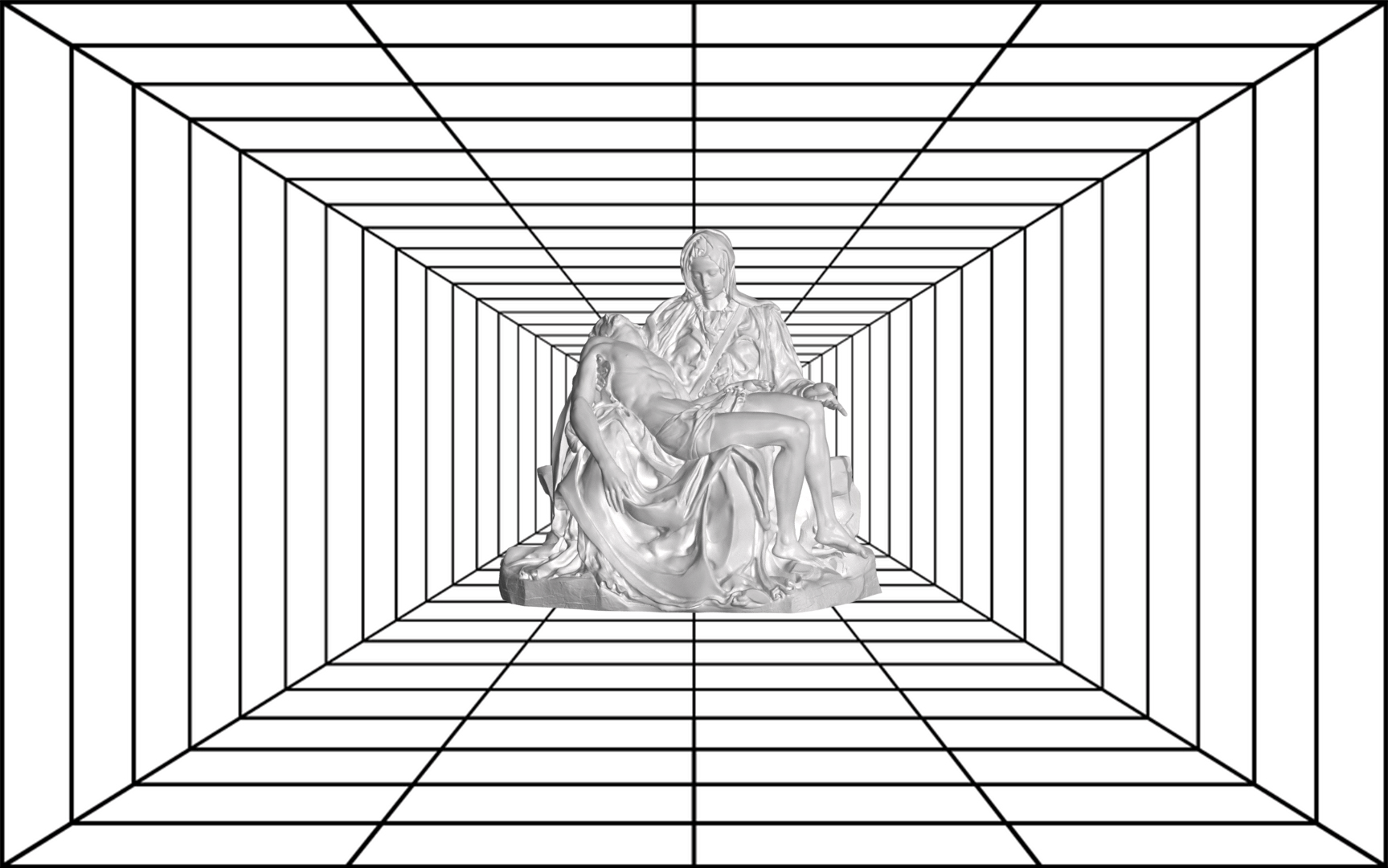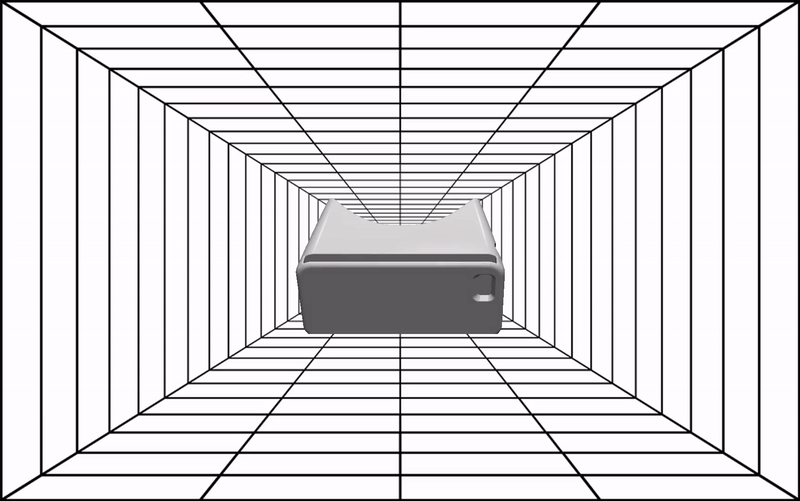

A few months ago, I found myself a lone skeptic in a sea of believers at the VR L.A. Expo. I watched heads tilt toward the sky (then the ground, then side to side). I navigated long lines that snaked through a grid of cardboard booths, filled with eager believers awaiting communion not with God but with pixels. I heard the feverish whispers of the prophets of our 2D wilderness (they who consume Soylent instead of locusts and honey). A New World is coming, they said.
That is to say, virtual reality, or VR, is already quasi-religious. It bears a messianic promise for its advocates. According to them, it will revolutionize the way we communicate, work, consume media, and even pray. Slip into a headset and suddenly you can be in the middle of St. Peter’s, hearing benedictions by Pope Francis himself. Disabled? No problem. “No longer will one's lack of physical ableness be a deterrent that keeps people from ushering or serving communion,” writes Reverend Christopher Benek in an op-ed for the Christian Post, “Virtual Reality Will Enable the Next Large Revival in the Global Church”.virtual reality is already quasi-religious
For Benek, the primary ecclesiastical service VR will enable is remote church attendance. He imagines that with the addition of augmented reality, or AR, a community could gather regardless of physical location. Although the pews may be mainly empty, with AR contact lenses, they would appear filled with all those who could not make it in person. Already, many churches live-broadcast their services. Likewise, Buddhist sanghas increasingly stream their teachers' talks. VR would be the natural extension. Instead of putting money in a basket, you could send gold tokens—perhaps tethered to the Bitcoin blockchain (why not?).
But the possibilities of virtual religiosity extend beyond increasing church attendance. It is easy to imagine entirely virtual chapels; spaces that defy physics and approach the divine. For centuries, religions have employed architecture to induce spiritual experiences or represent the glory of a deity; imagine the possibilities of a space untethered by the strictures of reality. Of course, different religions deal with representation and transubstantiation differently, so VR spaces would differ as much as physical sacred spaces. You can take a VR tour of the Masjid Al-Haram mosque, but don't expect recreations of the Prophet's life. Likewise, the Second Temple is being recreated in virtual reality, but Judaism's strong anticonist tradition would prohibit any depictions of YHWH.

With VR Church, a VR experience on Oculus, users can wander through lushly rendered gardens and read psalms and beatitudes, as they listen to “ambient worship music”. “The Psalms & Beatitudes are laid out in blocks around you in a way inspired by the roman room technique in order to make the experience as memorable as possible,” reads the description. “In the different gardens you will be able to not just read; but also relax, meditate and worship.” Similarly, VR offers, for some, the tantalizing idea that religious education could be spiced up for a generation raised on video games.
Meanwhile, Deepak Chopra has worked with VR developers to create Finding Your True Self. Strap in, sit back, and be guided through meditations. "Soon, with the soothing voice of Deepak Chopra in my ear, the tree and the plain disappeared from my sight, and I found myself looking into the void of deep space, dark and fathomless, facing a giant, floating bronze statue of the Buddha, astral colors radiating from his third eye," writes Sam Dean for MEL.
One could argue that rituals like the Stations of the Cross already constitute a virtual reality. As one passes by a series of stained glass windows, they imagine movements layered on the glazed surface. Inherited stories take on life through their visual representation. But VR blows that open. Instead of imagining the Passions of the Christ, one could theoretically experience them—perhaps even from the vantage point Jesus himself (although that might constitute blasphemy).The viewers truly feel they are there with Jesus and his disciples
In fact, Autumn Productions and the virtual-reality production firm VRWERX will release Jesus VR—the Story of Christ sometime in the next month. The 90-minute feature is one of the first full-length VR movies and depicts the entirety of Jesus’ life—from his baptism to his crucifixion. Shot in 360-degree 4K in Matera, Italy (where the Passion of the Christ was filmed), the movie is intended to transport viewers into the biblical tale. “The viewers truly feel they are there with Jesus and his disciples,” states director and producer David Hansen. “This is the most powerful story of all time and virtual reality is the perfect way to tell it.”
And for a select group of people known as “transhumanists”, VR is part of the technological arsenal that could grant humans immortality. According to Gabriel Rothblatt, a pastor of the “Terasem Movement”, which attempts to merge science with religion and philosophy, “Heaven could be a virtual reality world hosted on a computer server somewhere." They believe that in the near future, we’ll be able to upload our memories and continue to live in virtual environments long after our bodies have decomposed. Here’s hoping that someone remembers to pay the power bill.
For more on religious architecture, check out more content made for Archinect's special December theme, Faith.
Writer and fake architect, among other feints. Principal at Adjustments Agency. Co-founder of Encyclopedia Inc. Get in touch: nicholas@archinect.com
2 Comments
YOU WOULD!
The irony here is so thick you need a chain saw to cut it. A so called piece of shit pastor actually finds a way to create an actual hell in the scheme below.
VR is part of the technological arsenal that could condemn humans to immortality. According to Gabriella Rothbutt, a "pastor" of the “Tera-semen Movement”, which attempts to merge science with religion and philosophy, “Hell could be a virtual reality world hosted on a computer server somewhere. Any captured minds of individuals the pastor and his followers deem unworthy can then be caged within a VR environment where they are tortured forever.
Sounds uniquely and supremely immoral. Let's hope science will continue to resist this false notion of a "merger" with religion. If any these immoral pieces-of-shit try to peddle their vile schemes near me? Well, let's just say I guess I will finally need a weapon of some kind. These articles are about the most horrifying visions I have ever had the displeasure of reading.
Block this user
Are you sure you want to block this user and hide all related comments throughout the site?
Archinect
This is your first comment on Archinect. Your comment will be visible once approved.